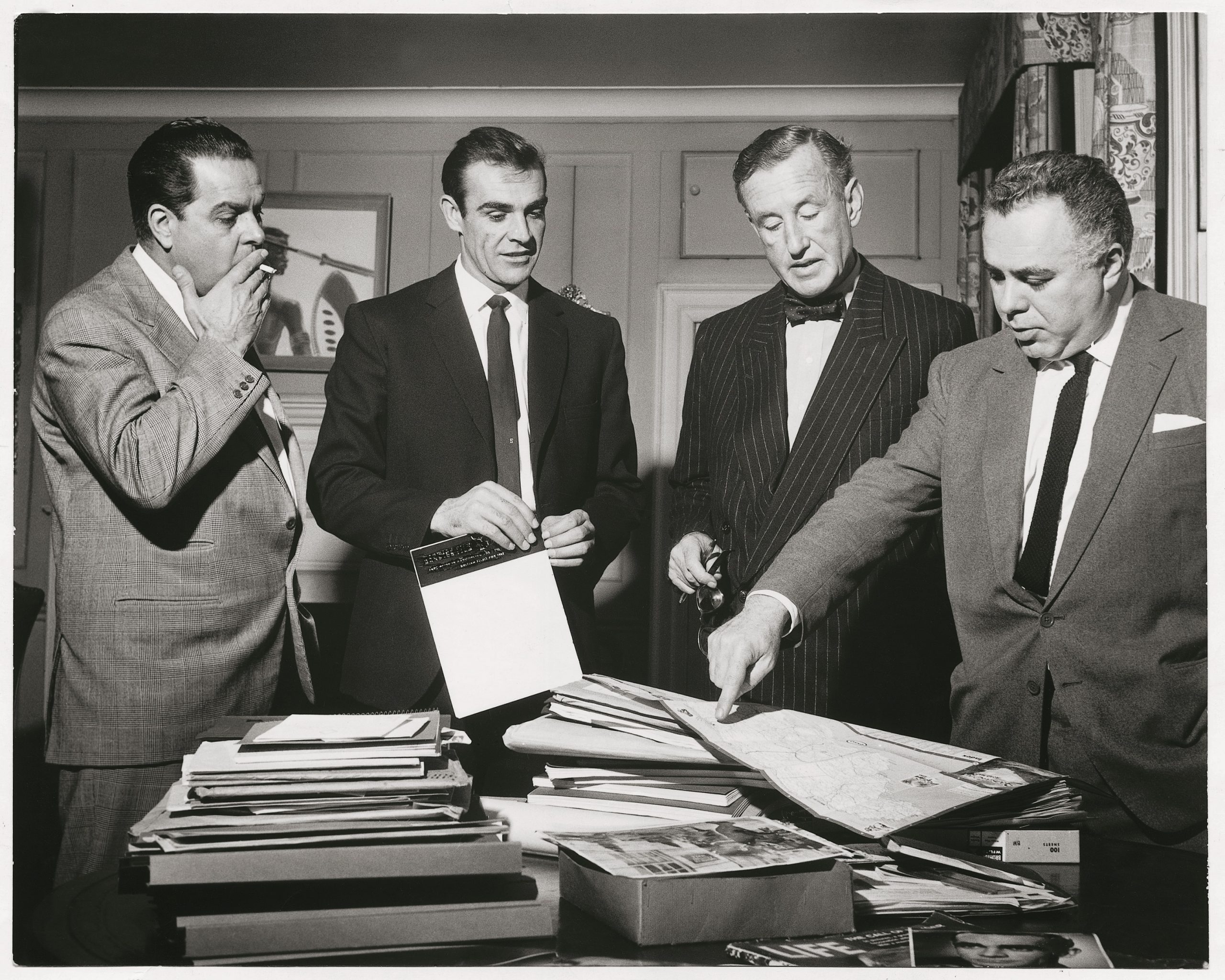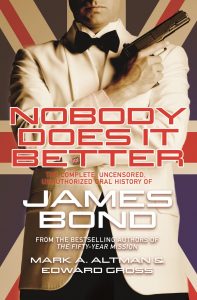
Nobody Does it Better: The Complete, Uncensored, Unauthorized Oral History of James Bond is a must-own book for James Bond fans.

Mark A. Altman and Edward Gross draw on both their own interviews and archival interviews in telling the story of James Bond. They go back to where it all began with Ian Fleming, including the first attempts to bring Bond to either the big or small screen. In 1954, the first on-screen incarnation of Bond was in the form of Barry Nelson as an American agent James Bond opposite Peter Lorre as Le Chiffre. But it is the events of a few years later that would come back to bite Bond in the ass in later years. Kevin McClory may have meant well but he eventually grew to be a thorn in the side for Cubby Broccoli. He was one of the first to approach Fleming about film rights. It’s a long story but McLory would later own screen rights to aspects of the Thunderball novel.
This book may be 720 pages but it’s essential given Bond’s history. The films date back to 1962 and the novels longer than that. It’s fascinating to see where the character has been and how the environment plays a role. Live and Let Die doesn’t just introduce Roger Moore as the new James Bond but plays into the era of the moment. Similarly, Moonraker plays into the height of Star Wars in the late 1970s. Unfortunately, Moore’s on-set hijinks would go onto hurt Jane Seymour’s feelings. Some actors might be pranksters but people shouldn’t find out years later when you write a book about what happened!
The duo interview a lot of people or use archival materials. Some people, however, are not open to discussing their feelings about Bond films, official or otherwise. One of them is Kim Basinger when it comes to Never Say Never Again. In a perfect world, this film doesn’t get made. However, McClory had the rights and wanted to remake Thunderball. Say what you will about Woody Allen but he’s rather open about the 1967 Casino Royale spoof. After acquiring the Never Say Never Again rights, MGM would go onto acquire the Casino Royale rights in 1997. MGM had to give up their rights to Spider-Man in order to get Sony’s rights to anything related to James Bond. Interestingly enough, John Calley came over to Sony from MGM and knowing about McClory’s rights, he was all set to launch an alternate 007 series.
Things I learned while reading this book: antisemite Roald Dahl was hired to write the screenplay of You Only Live Twice as a favor to Ian Fleming. To no surprise, the two British authors were friends. Dahl was in a bad state financially and so Harry Saltzman and Cubby Broccoli hired him to write the script. In an irony of ironies, Jewish filmmaker Lewis Gilbert directed the film. But perhaps we can learn something from this because once we get into Live and Let Die, screenwriter Tom Mankiewicz points out that Ian Fleming himself was a racist and antisemite. But of course, there’s more than just this.
Fleming wrote the character during a different era and while the cinematic Bond has withstood the test of time, the literary Bond hasn’t. Fleming’s views may have been what went for the 1950s and 1960s but not in the 21st century. In fact, Broccoli and company used GoldenEye to bring Bond into the late 20th century. A decade later, they’d turn to Martin Campbell once more to reboot the franchise with Daniel Craig in the title role. Following initial scrutiny, Craig is calling it quits after No Time to Die.
You could not adapt the literary Bond into a film today. Not in a post-Me, Too environment anyway. Bond is the type of character that must evolve with the times. I think we’re seeing this through the Daniel Craig films. While I haven’t started the full James Bond binge yet, I want to say that the Sean Connery films and arguably the Roger Moore films do not age well. It’s been many years since watching (Goldfinger aside) but it’s hard to look at the 1960s Bond women and see them in similar roles today. I know I’m not alone in this line of thinking. No Time to Die director Cary Fukunaga was candid about the character during an recent interview with The Hollywood Reporter.
“Is it Thunderball or Goldfinger where, like, basically Sean Connery’s character rapes a woman?” Fukunaga asks. “She’s like ‘No, no, no,’ and he’s like, ‘Yes, yes, yes.’ That wouldn’t fly today.”
Case in point: M’s (Judi Dench) line from GoldenEye in 1995: “Good, because I think you’re a sexist, misogynist dinosaur. A relic of the Cold War, whose boyish charms, though wasted on me, obviously appealed to that young woman I sent out to evaluate you.”
Even Barbara Broccoli knew that Bond needed to change:
“I think people are coming around — with some kicking and screaming — to accepting that stuff is no longer acceptable. Thank goodness. Bond is a character who was written in 1952 and the first film [Dr. No] came out in 1962. He’s got a long history, and the history of the past is very different to the way he is being portrayed now.”
I’ll be curious to see if another edition will follow with commentary on No Time to Die. For now, the world premiere takes place on Tuesday. There’s a lot of expectations for the film to do well at the box office especially with the pandemic. We’ll see what happens in that regards.
If you’re a James Bond fan, Nobody Does It Better is a must-own.



